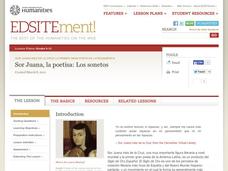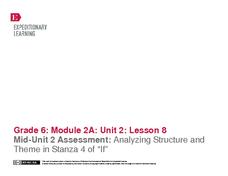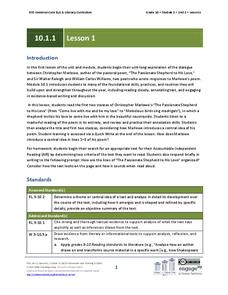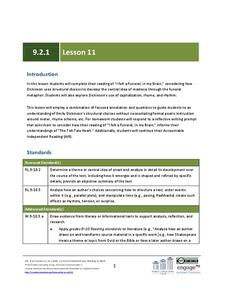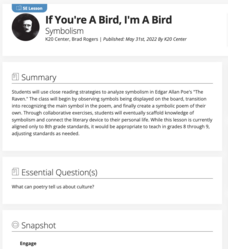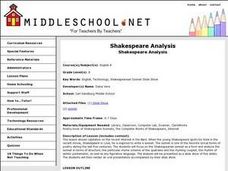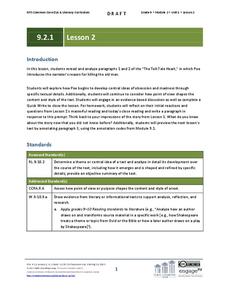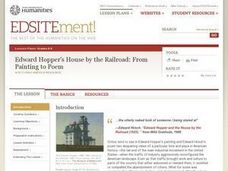National Endowment for the Humanities
Sor Juana, la poetisa: Los sonetos
Examine two of Sor Juana's sonnets in depth. Learners first listen to an audio recording or a reading of the sonnets and then analyze the structure and form, paying attention to elements of the Baroque and el gongorismo. Assess student...
EngageNY
Analyzing Structure and Theme in Stanza 4 of “If”
Here is a lesson that provides scholars with two opportunities to stretch their compare-and-contrast muscles. First, learners compare and contrast their experience reading the fourth stanza of If by Rudyard Kipling to listening to the...
National Endowment for the Humanities
The Impact of a Poem's Line Breaks: Enjambment and Gwendolyn Brooks' "We Real Cool"
Young scholars analyze the Gwendolyn Brooks use of enjambment in her poem "We Real Cool." In this poetry analysis activity, students define common poetic devices and the examples of enjambment in the poem. Young scholars discuss the poem...
Prestwick House
Teaching Shakespeare: Sonnet 73
It's that time of year to consider how Shakespeare selects his images and structures his Sonnet 73 to develop the meaning of the poem. Class members examine the rhyme scheme, the indented lines, the conceit, and the images used in each...
Prestwick House
Poe’s “The Raven” – Unity of Effect
How do Poe's choices of imagery, rhythm and rhyme scheme, and structure help build the desired single effect of "The Raven"? After listening to a dramatic reading of the poem, class members consider whether Poe's choices do create a...
Weber County Library
Abstract Ideas Explored: Writing with Extended Metaphor
A 25-page packet includes eight detailed lesson plans centered around poems by Emily Dickinson. Each lesson plan begins with a burning question that students attempt to answer by using evidence from Dickinson's poems.
EngageNY
Grade 10 ELA Module 1: Unit 1, Lesson 4
Guide high schoolers through the most successful and efficient ways to address a text with a literary analysis instructional activity. As learners find examples of alliteration in Christopher Marlowe's "The Passionate Shepard to His...
EngageNY
Grade 10 ELA Module 1: Unit 1, Lesson 1
Can authors speak to each other across works, genres, and centuries? Study the conversation between Christopher Marlowe in his poem "The Passionate Shepherd to His Love" and the responses by Sir Walter Raleigh and William Carlos Williams...
EngageNY
Grade 9 ELA Module 2: Unit 1, Lesson 10
An engaging unit connects Edgar Allan Poe and Emily Dickinson's shared themes of madness and departure from reality. The 10th lesson in the unit explores Dickinson's figurative language and structure choices in "I Felt a Funeral, in my...
EngageNY
Grade 9 ELA Module 2: Unit 1, Lesson 9
Continue analyzing literature using textual evidence with a lesson on "I Felt A Funeral, in my Brain" by Emily Dickinson. Ninth graders bring their annotation skills and knowledge of figurative language from the previous eight sessions...
EngageNY
Grade 10 ELA Module 1: Unit 1, Lesson 2
If you only read a poem once, you'll miss many levels of analysis and comprehension. High schoolers finish reading "The Passionate Shepard to His Love" by Christopher Marlowe and discuss how the poem's organization contributes to its...
EngageNY
Grade 9 ELA Module 2: Unit 1, Lesson 11
The capitalization rules are strict and inflexible—until you experience the fluid beauty of an Emily Dickinson poem. Ninth graders test their existing knowledge of language arts conventions with the many bent grammar rules in "I Felt a...
Curated OER
Japanese Poetry: Tanka? You're Welcome!
Students analyze Japanese tanka poetry. In this Japanese poetry lesson, students identify analyze the structure of tanka poetry. Students complete the activities at the given links for the lesson and compose two tanka poems.
Curated OER
Response to Literature: Anecdotal and Saga Memoir Poems
Students differentiate between anecdotal and saga memoir poems. In this response to literature lesson plan students analyze poems written by others then analyze incidents from their own lives to determine whether they meet the criteria...
Curated OER
Review Steps in the Writing Process and Explore a Poem
Students practice their persuasive writing skills. For this writing process lesson, students write essays that meet the requirements of the included text element worksheets and analyze poetry of their choosing.
Curated OER
Exposure: A Poem by Wilfred Owen
Here’s a great way to engage your pupils in poetry analysis. Show your class this student-produced, PowerPoint analysis of Wilfred Owen’s “Exposure.” Have your class critique the strengths and weakness of the presentation. (They are sure...
EngageNY
Grade 10 ELA Module 1: Unit 1, Lesson 5
If you've ever wished you could respond to an author's message, an instructional activity that connects three poems with the same concept will appeal to you. Based on the first few lessons' focus on Christopher Marlowe's "The Passionate...
K20 LEARN
If You're a Bird, I'm a Bird: Symbolism
Would a bluebird be as scary as a vulture? Edgar Allan Poe's "The Raven" is the central text in a lesson plan about symbolism. After a close reading of the poem, learners consider what the raven might represent to the narrator. They then...
National Endowment for the Humanities
“The Great Migration” by Minnie Bruce Pratt
Minnie Bruce Pratt's poem, "The Great Migration," offers young scholars an opportunity to reflect on how where we come from influences who we are. Groups conduct a close reading of the poem, recording observations about the poem's...
Curated OER
Shakespeare Analysis
Eighth graders focus on the Shakespearian sonnet as a form and analyze the sonnet in terms of structure, the particular rhyme scheme of the quatrains and the rhyming couplet, the rhythm of iambic pentameter, as well as any figurative...
EngageNY
Grade 10 ELA Module 1: Unit 1, Lesson 3
Poets write love letters, but how often do the objects of their love write back? Compare Christopher Marlowe's "A Passionate Shepard to His Love" to Sir Walter Raleigh's response, "The Nymph's Reply to the Shepherd," with an engaging...
EngageNY
Grade 9 ELA Module 2: Unit 1, Lesson 2
Make up your mind to complete a lesson plan about "The Tell-Tale Heart" and forever rid yourself of simple sentence structures. As ninth graders analyze the first two paragraphs of Edgar Allan Poe's short story, they consider how text...
Curated OER
Edward Hopper's House by the Railroad: From Painting to Poem
Students analyze Edward Hopper's painting and Hirsch's poem to explore the types of emotion generated by each work. In this literary and art analysis activity, students discuss how Hopper establishes tone and analyze Hirsch's use of...
Maryland Department of Education
A Raisin in the Sun and Dreams Deferred
To conclude a study of A Raisin in the Sun and to prepare for a visit to the Lewis Museum, class members analyze Langston Hughes' poem "Harlem." Learners then draw connections to characters in the play and to their own experiences by...


